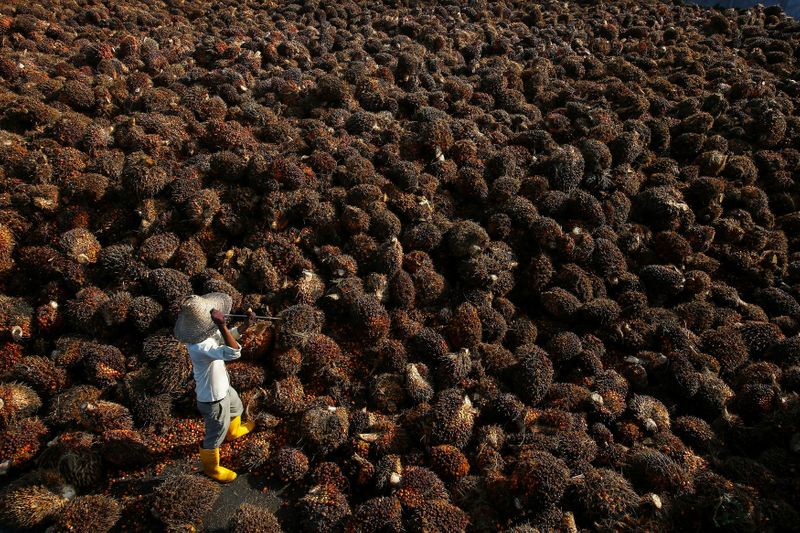By Mei Mei Chu
KUALA LUMPUR (Reuters) - Some Malaysian palm oil plantations are discouraging foreign workers from going home at the end of their contracts and are asking them to keep working as the novel coronavirus exacerbates a chronic labour shortage, rights groups say.
Malaysia's two biggest palm planters said they were not forcing workers to stay but efforts to repatriate migrants had been slowed by novel coronavirus travel restrictions.
Malaysian plantations have long faced accusations of mistreating the 330,000 or so migrants who make up 84% of the workforce producing palm oil, which is used in everything from food to soap. The crop has also drawn criticism from environmentalists over the clearing of forests to plant it.
Hong Kong-based anti-trafficking group Liberty Shared told Reuters it had interviewed dozens of plantation workers in Malaysia and many had said they wanted to leave but had been told they could not because of coronavirus restrictions.
Labour rights group Verite and the Malaysia-based non-governmental group (NGO) Tenaganita said they had received similar complaints. All three groups said they believed the issue was common and that thousands of workers could be affected.
"We're seeing workers discouraged from leaving, being asked to keep working, paid in cash or not paid at all, paid late, promised a ticket home and then that promise isn't satisfied," said Duncan Jepson, managing director of Liberty Shared.
A senior official in the Labour Department of the Ministry of Human Resources, which is responsible for foreign workers, said it had not received any such complaint but viewed allegations seriously and urged NGOs to report them.
Most foreign workers are from India, Bangladesh and Indonesia and are paid by the amount of palm fruit they harvest, sometimes complaining they do not make the 1,100 ringgit ($270) minimum monthly wage.
At the end of contracts - usually for three years - they can go home but there were complaints even before the coronavirus that companies discouraged them from leaving because it costs more to replace them.
The pandemic has exacerbated the labour crunch with companies unable to fly new workers in because of travel restrictions.
Liberty Shared said it sent a complaint to Malaysia's anti-trafficking agency on Dec. 8, asking for help in the cases of five specific workers who had been trying to go home for months.
The agency did not immediately respond to a request for comment.
'EXACERBATING VULNERABILITY'
One Indian worker at a plantation run by the state Federal Land Development Authority (Felda) told Reuters he had been asking to go home since March, in part because of ill health, and his contract expired in June.
The worker, who declined to be identified for fear of reprisals, said he paid 500 ringgit ($125) towards the cost of getting his passport but had no idea when he could leave.
Another worker at the estate said he had been trying to go home since January. He said he had paid 2,000 ringgit ($493) to break his contract after two years, get back his passport and for a flight but was waiting.
Both said they had continued to work.
Felda told Reuters it had not received any reports of such cases but the Indian High Commission in Malaysia said it had received requests for assistance from Felda workers and was working with the company to repatriate them.
India has arranged more than 100 repatriation flights since March, according to the mission's website.
Felda is the biggest shareholder of FGV Holdings, the world largest crude palm oil producer.
Companies have for years been accused of forced labour practices, including withholding passports and sexual violence. In October, the United States banned imports of FGV's palm products over accusations of labour abuses.
"What COVID-19 did is really just to exacerbate the vulnerability of these workers," said Melizel Asuncion, a programme manager with Verite.
Indonesia's embassy said it had complaints from its nationals stuck on plantations due to the pandemic. It said it was asking the companies to help workers go home.
A former worker for Sime Darby Plantation, who was repatriated to Bangladesh for health reasons, said managers had tried to discourage workers from leaving.
"They scold us saying 'can't go back, flights are not moving ... work here, stay here, what's so difficult?'," said the worker, who also declined to be identified.
Sime Darby, the world's biggest palm grower by plantation area, said it had repatriated 1,125 workers since July and any suggestion of forcing workers to stay was baseless. It said it got about 200 repatriation requests a month.
"While the pace of execution has been hampered by restrictions on movement and travel, we are continuing to engage with all key stakeholders," it said in a statement.

($1 = 4.0670 ringgit)